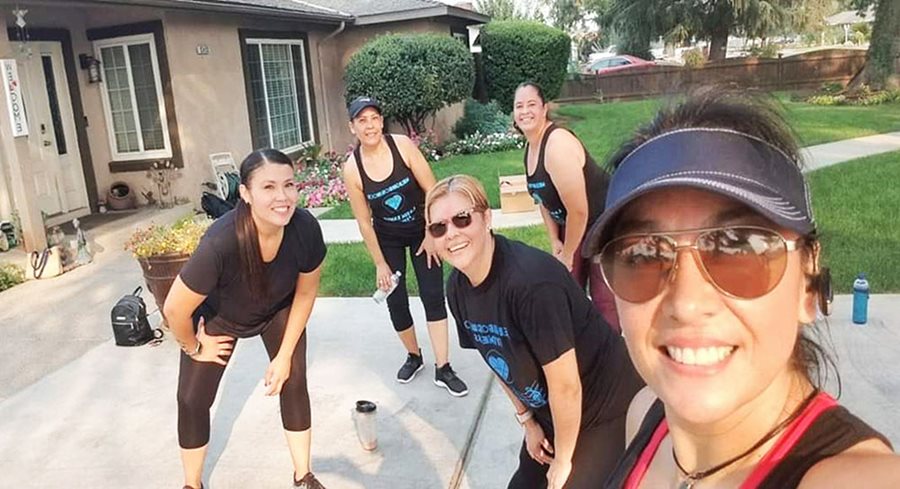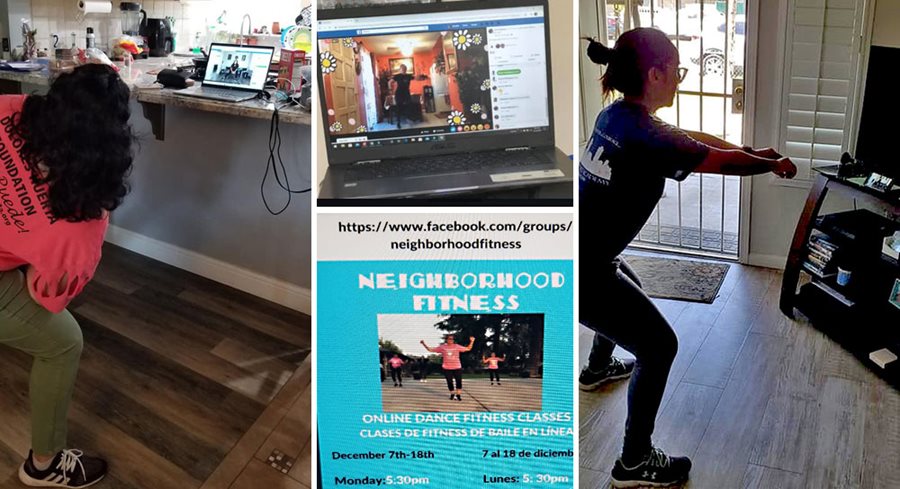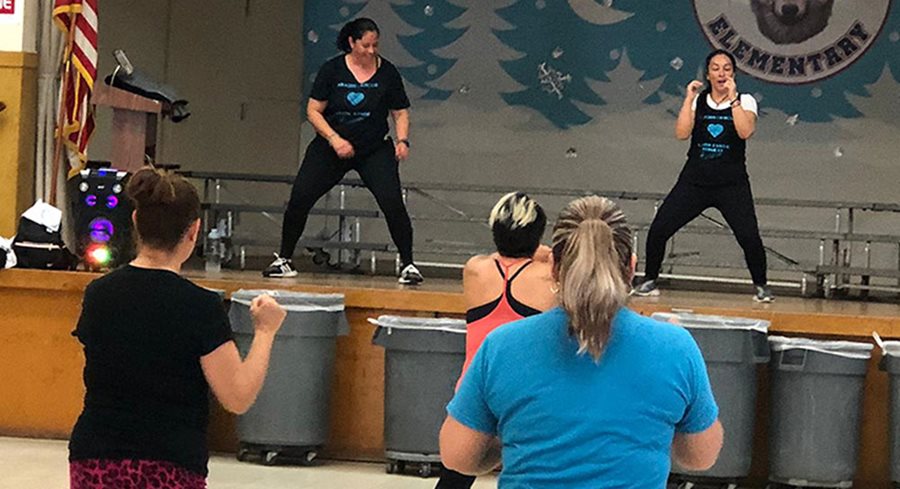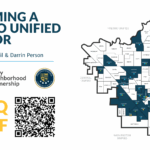Original post by Community Medical Centers.
At the end of Latin dance fitness classes, instructor Susana “Suzzy” Pinal says her students would gather to talk – often about their health or their family’s medical issues. She was always getting questions about new medications a doctor prescribed or a natural remedy viewed on the internet.
“I would tell them it is important to know what is the source that it’s coming from. Is it a trusted resource? Is it a doctor? What kind of license does the doctor have?” Pinal says. “I’m not a doctor, I just have my medical assistant certificate.”
But after 65 hours of training this winter to become a Promotora de Salud, or community health worker, Pinal feels more qualified to offer advice and teach her neighbors and fitness students what she knows.
Community Medical Centers helped secure a $75,000 grant, through its leadership role in the Fresno Community Health Improvement Partnership’s Diabetes Collaborative, to hire eight promotoras and a program coordinator. The Diabetes Collaborative along with Every Neighborhood Partnership, a non-profit serving low-income Fresno neighborhoods, is using the grant funding to educate recognized neighborhood community leaders on the promotora health promotion model.
Under the grant for Every Neighborhood Partnership, promotoras engage Latino, Hmong and Black families and individuals at risk of developing diabetes and chronic disease conditions in southeast and southwest metropolitan Fresno.
Great need for culturally appropriate healthcare
In the U.S., Latinos have higher rates of medical conditions leading to heart disease and stroke, including diabetes, obesity, high cholesterol and high blood pressure. Heart disease and cancer are the leading causes of death. But more alarming is the fact this ethnic group is 50% more likely to die from diabetes or liver disease than whites.
Much of this discrepancy is tied to lack of access to culturally appropriate care, medical providers who speak the same language and regular health screenings. Because of this, Spanish-speaking and immigrant communities are more likely to turn to a community leader for health advice than to a doctor, says Alma Martinez, Community’s community outreach project manager who helped write the promotora grant.
“There aren’t many trusted sources in the community. And that combined with fear and language barriers makes the promotora role much more vital for agencies to get factual and timely health information to families,” Martinez explains. In addition to hospitals and clinics, health plans and public health agencies are looking to promotora outreach to disseminate vital information for families who may be hard to reach.
Bridge-builders help create trust in institutions
“It’s important, especially this past year with all the distrust in government and the uprisings, to build institutional trust and community trust,” says Andrew Feil, executive director of Fresno’s Every Neighborhood Partnership. “It’s really about connections and about building those relationships.”
Pinal agrees, “It’s really important for us to share in the community in our cultural ways. Our culture is very afraid and lots of people don’t understand about COVID and the vaccination. There’s the fake news about vaccinations all around. I’ve been having conversations with groups of old ladies asking about it and asking what I am thinking about vaccination.”

Every Neighborhood Partnership has been relying much more on promotoras to distribute resources and education. “We just got 6,000 diapers to give out and we could’ve gone through food distribution sites,” explains Feil. “But we are letting our residents build their networks and find the folks who need them. In a matter of two weeks through eight promotoras, they’re already taken. That’s the shift we’re trying to make – to empower and support our neighborhood residents as the bridge-builders.”
Fresno County’s first promotora program
This is the first promotora program in Fresno County, but other places are employing similar outreach workers with great success. Using promotoras to talk about various health issues has helped improve cervical cancer screening rates among Hispanic women, according to the Centers for Disease Control and Prevention, which produces educational fotonovelas, or comic books, and other health promotion materials specifically for promotoras.
Besides dispensing health education, promotoras often act as mentors, patient advocates and translators for their neighbors. But their primary focus is on increasing access to care and better management of chronic diseases, especially diabetes.
Promotoras train in disease management, Medi-Cal connection
Jennifer Parra, Every Neighborhood Partnership’s promotora program coordinator says that promotoras received training on:
- Signing up families for managed Medi-Cal and Cal Fresh food assistance
- Improving self-management of diabetes and other chronic diseases
- Preventing trauma and injury through Community Regional Medical Center’s program
- How to recognize and mitigate Adverse Childhood Experiences (ACEs) and create more nurturing environments for children
- Mentoring and communication techniques
- How to tap into city resources such as zoning code enforcement in their neighborhoods
Crucial this year for promotoras was digital and technical literacy as they switched to virtual training and online outreach due to public health restrictions during the coronavirus pandemic. “Everything is virtual now,” says Parra. “So Suzzy has been trained on Zoom and GoToMeeting as well, and so she has been helping people to use their computers and we’re going to be doing more training on that.”

Now promotoras are conducting fitness classes through Facebook Live, using WhatsApp and other chat platforms to talk with their neighbors about health concerns, says Parra and Pinal. An online mental health support group also started just before Christmas after residents in the area expressed a need. “We have all this great health information to give them, but if they don’t have good mental health, that information is difficult to access,” says Parra.
Promoting healthier lifestyles through shared experiences
“I think having promotoras in the community is very important. And it’s for every area – physical and mental health, for emotional health as well,” says Pinal, who focuses on helping other mothers like her turn around their own health. “If the mother is healthy, then all the family is healthy too.”
Pinal found that out through her own experiences. “Six years ago, I suffered from depression and obesity,” she shares. Her sister encouraged her to take a workshop on Latin dance instruction. “I began to change by doing physical activity. And at home I began to make changes by adding in more fruit and taking away sodas. I stopped eating cheese and ate less tortillas and I added in ginger.”
“I remember my skin started to look better and my hair started growing. Now it’s long again and curly,” she continues. Others took note. “The Latin dance class people started to see the changes. At first it was emotional. People said, ‘You are so happy, so different. Your body is changing.’ And all the ladies were asking, ‘How did you do that? What are you drinking in the morning? How are you maintaining a positive attitude all the time?’”
Pinal says she often ends her fitness classes by sharing healthy recipes: “I explain how certain things have more vitamins and nutrients. Sometimes I do a little ‘In the Kitchen’ talk about how to use food to reduce depression.”
Neighborhood dance classes were the start of promotoras
Several of Every Neighborhood Partnership’s promotoras got their start as dance fitness instructors with the help of Community’s financial support. Since 2018, the healthcare system has invested nearly $30,000 to purchase sound systems for 12 sites and help train more than 50 dance class instructors as part of an effort to encourage healthier lifestyles in neighborhoods where residents were not likely to have access to gyms or parks.
Support for the fitness instructors and promotora training is part of the community benefit work the not-for-profit hospital system does annually in response to the region’s identified health needs. Obesity and diabetes are the second biggest health challenges listed in the regional Community Health Needs Assessment. Last year Community provided $175.3 million in outreach and education, support for local service organizations, medical education and training, and in unreimbursed costs of medical care for the poor and underserved.
The dance fitness program was prompted after a series of community meetings with southeast and southwest Fresno neighborhood parents, local non-profit organizations and healthcare providers. Participants expressed the need to exercise in safe spaces with consistent class schedules.

Before the COVID-19 pandemic, the free classes were held at 14 sites including Fresno Unified elementary and high schools, community centers and a local playground. Participants’ reported results include increased self-esteem, a heightened sense of community and weight loss.
Healthy change spills over into economic uplift
“I’m helping contaminate my community,” Pinal says jokingly, “but in a positive way. It’s not only helping them change their health, but there are changes professionally too. People are now wanting to learn English or a new career.”
Pinal shares that one of her Latin dance class participants gained enough confidence to apply for and become a secretary in Clovis Unified School District, which was specifically looking for Spanish speakers in that role. “She always says to me, ‘Thank you for you. I was afraid, but I wanted to learn and you encouraged me,’” says Pinal.
“People can change not only their health but their profession and their life. I feel proud of that.”






Leave a Reply